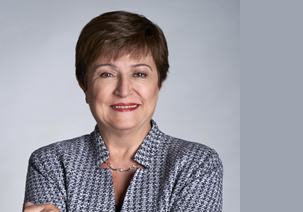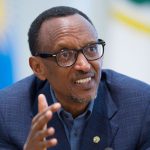IMF To Boost Reserves And Liquidity Of African Nations With $33bn
African News, Featured, Latest Headlines, News Around Africa Friday, June 25th, 2021
(AFRICAN EXAMINER) – International Monetary Fund (IMF) has pledged to make $33 billion available for African nations to boost their reserves and liquidity.
The Managing Director of IMF, Kristalina Georgieva made the pledge in her paper, entitled, “The Ahead for Africa – Fighting the Pandemic and Dealing With Debt”, delivered at the Annual Meeting Africa Development Bank (AfDB) on Wednesday.
Georgieva said the IMF has swiftly ramped up its financing for Africa, including by providing in one year 13 times its average annual lending to sub-Saharan Africa.
“We have received support to increase access limits, so we can scale up our zero-interest lending capacity. Our membership also backs an unprecedented new allocation of Special Drawing Rights (SDRs) of $650 billion by far the largest in our history.
“Once approved, which we intend to achieve by the end of August, it will directly and immediately make about $33 billion available to our African members. It will boost their reserves and liquidity, without adding to their debt burden, and it will help address their emergency needs, including vaccines.
She added that they are working towards magnifying the impact of the new allocation, by encouraging voluntary channeling of some of the SDRs and/or budget loans to reach a total global ambition of $100 billion for the poorest and most vulnerable countries.
“We are exploring with our membership options on how we can get this done—through the Poverty Reduction and Growth Trust and possibly a new Sustainability and Resilience Trust.
“In this pivotal moment, Africa can count on the IMF. We are deeply committed to all countries in the region, supporting the heavy lifting on recovery efforts and transformative reforms. Together we can move mountains. Together we can lay the groundwork for a more prosperous and peaceful future”, she added.
She noted that the AfDB’s Annual Meetings are taking place at a critical moment for Africa and for the world, stressing that “more than ever, we must all come together to end the pandemic and secure the recovery”.
Africa, according to her, is now facing the world’s fastest growth rate for new COVID cases, with an exponential trajectory even more alarming than during the second wave in January. She said based on current trends, this wave will likely surpass previous peaks within the next week.
“It is a human tragedy, and an economic calamity. Countries across the continent, from South Africa, to Uganda and Rwanda are forced to reintroduce restrictions, further denting a precarious recovery. In the face of new variants, Africa is ill protected, due to severe vaccine shortages. So far, only 0.6 percent of Africa’s adult population have been fully vaccinated.
“I am encouraged by pledges for vaccine support from international partners, including one billion doses announced at the G7 summit. I strongly support efforts to diversify vaccine production on the Continent. And I commend the African Development Bank and the African Union for providing vital support, including through Rapid Response Facilities and vaccine procurement.
“At the IMF, we are also working on deploying our financing instruments to ensure that health systems have the capacity to save lives and secure the recovery”, she further disclosed. And as we speak, our Executive Board is discussing the successful completion of Egypt’s Stand-By Arrangement, whereby the IMF provided about $8 billion to help Egypt address its pandemic-related financing needs, while helping to safeguard debt sustainability.
The IMF boss further stated that at the G7 summit, Development Financing Institutions and multilateral partners intend to invest at least $80 billion into the private sector in Africa over the next five years, adding that the G20 Compact with Africa remains a key framework to enhance the business environment in Africa and “now is the time to expand and strengthen this initiative”.
Georgieva stressed that the international community can help strengthen Africa’s recovery and resilience. She, however pointed out that the best way to deal with debt is for economies to grow.
“This is not an easy task during the pandemic, when governments face reduced revenues and increased spending on crisis measures. But this crisis is an opportunity for transformative reforms to improve public services, strengthen governance, and boost domestic revenue mobilization.
“Think of how digitalization can improve tax administration and revenue collection, and the quality of public spending. With radical transparency, Africa can tap into new sources of finance, such as carbon offsets. And there is room to encourage more private investment in social and physical infrastructure”, she further suggested.
Related Posts
Short URL: https://www.africanexaminer.com/?p=64663






















